LSI (Latent Semantic Indexing) keywords are an important part of SEO.
They help search engines understand the content on your website, and can improve your ranking in search results.
This post will explain how to find and use these terms to improve your online strategy.
Contents:
What Are LSI Keywords?
LSI keywords are words and phrases related to your main term and help users and search engines better understand the context of your content.
For example, if you are writing a blog post about SEO, some LSI keywords could be “search engine optimization,” “Google,” or “ranking.”
But let me tell you more.
This technology was originally introduced in a patent of 1989:
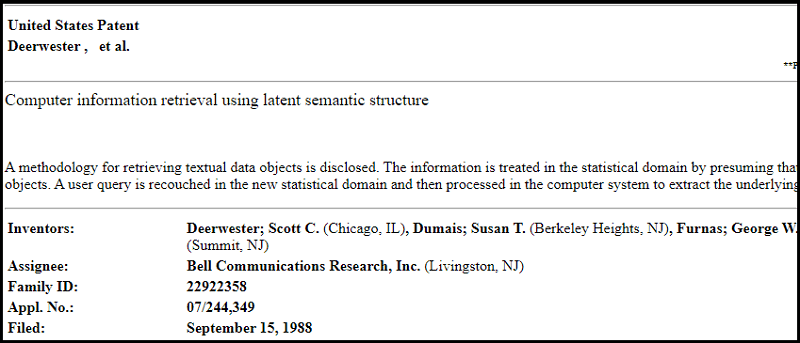
So, how does it work?
Latent Semantic Indexing is a way of indexing documents that looks at the relationships between words and concepts.
In other words, LSI is a computer program that is created to learn a large number of correlated words about a topic.

What Has Changed in SERPs?
Back in the day, bloggers and marketers used to write content focusing on just one term.
For example, if they wanted to rank in SERPs for the keyword “SEO metrics“, they would write an article with that title and stuff it full of that word.
However, things have changed since then.
Google’s algorithm has become much more sophisticated and can now understand the context of a page.
Let me explain why.
Latent Semantic Indexing was introduced in 2004, and it changed the way Google considers related keywords.
LSI helped Google move away from just looking at individual terms to understanding the relationships between concepts.
For example, if you search for “cold brew coffee” on Google, you will see results that include related terms like “recipes,” “brands,” and “drinks:”
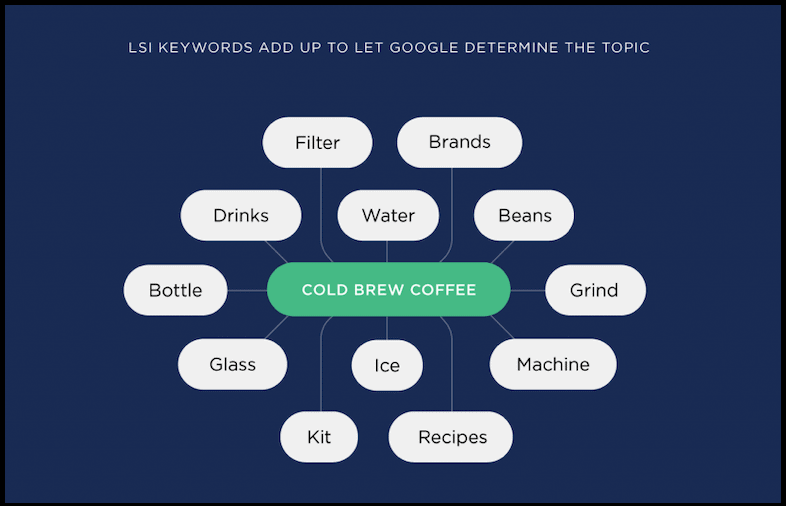
This shows that Google understands that these concepts are related to the keyword “cold brew coffee.”

Are LSI Keywords Like Synonyms?
They are similar to synonyms, but not the same thing.
Synonyms are words that have the same meaning as another term.
On the other hand, LSI keywords are related words that fall into the same topic.
For example, if you are writing about “autumn“, some synonyms could be “fall” or “season.”
However, some LSI keywords for the term “autumn” could be “leaves,” “pumpkin spice,” or “Thanksgiving.”

To better understand the concept, just perform a Google search for a certain term. For example, “duplicate content“:
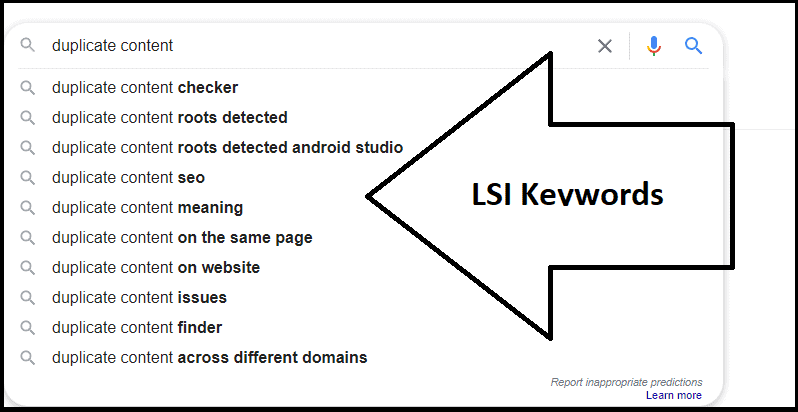
The suggested words that are displayed in the drop-down menu are LSI keywords.
SEO Benefits of LSI Keywords
Do you know that almost 95% of keywords have a volume of 10 monthly searches or less?
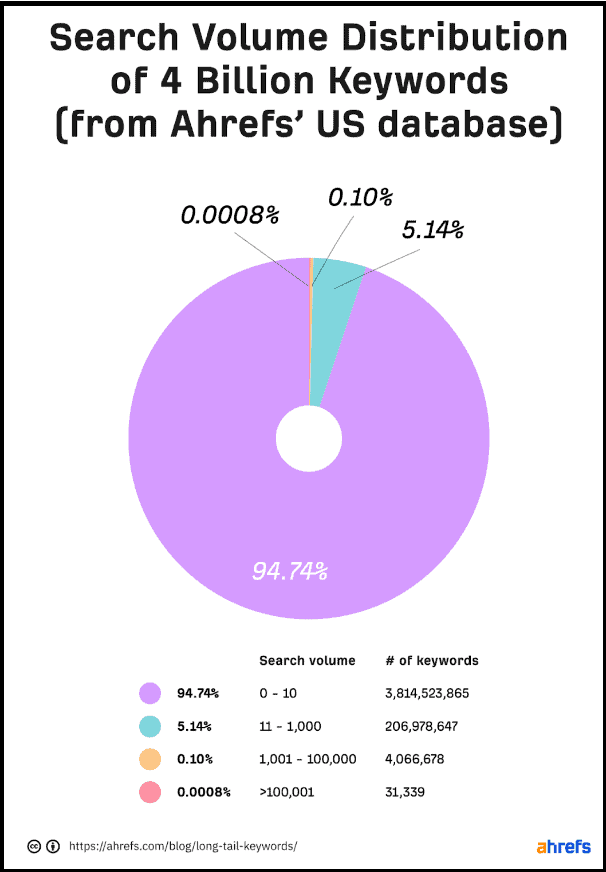
This SEO statistic comes from Ahrefs research on 4 billion keywords.
So, what does it mean for you?
It means you should take advantage of tons of untapped long-tail gems and get more organic traffic!
But wait, there’s more.
There are trillions of Google searches every year. And some of them have never been searched (specifically, 15% of the total).
Because of this, Google is constantly improving its algorithm to better understand related terms about a certain topic:

So, adding these terms to your content can give these SEO benefits:
- Helps Google better understand your content
- Increases the chance of your content ranking for related keywords
- Can help your content rank higher in Google search results
Including them in your content can help search engines understand what your page is about and how it is related to other concepts.

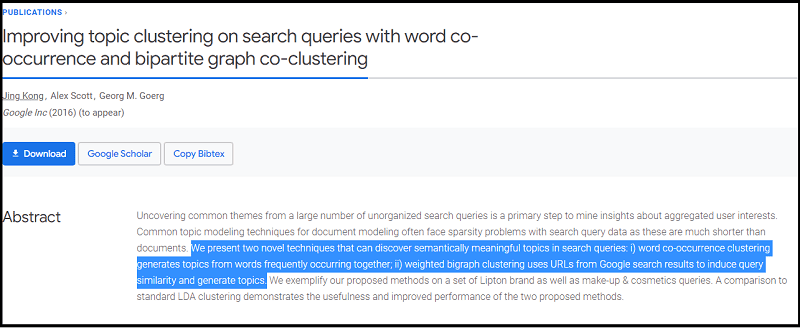
Tools to Find Related Keywords
There are several tools that you can use to find related terms for your content.
Here are some of my favorite ones (and completely free):
- Google Autocomplete
- Related Searches
- Google Keyword Planner
- People Also Ask
Google Autocomplete
Autocomplete is a feature that predicts what you’re going to type next.
It’s based on the most common queries that are similar to the ones you’ve already typed into Google.
To use Autocomplete for keyword research, simply start typing your main keyword into the Google search bar.
You will then see a list of related terms that you can use in your content.
Related Searches
Another great place to find LSI keywords is in the “related searches” section at the bottom of Google’s search results page.
It shows you a list of related terms that people have searched for.
Then, you can use them to help you come up with ideas for your content.
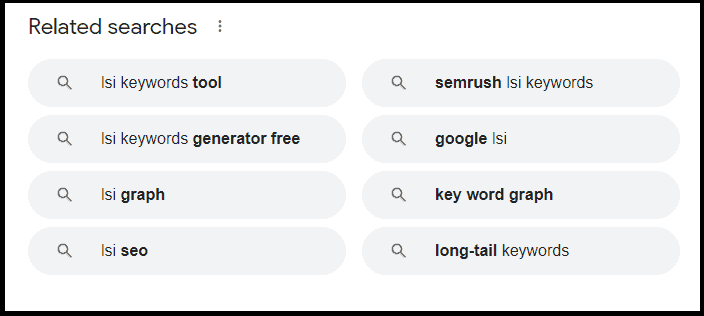
Google Adwords Keyword Planner
To use it, you will need to create a Google Adwords account.
Once you are logged in, go to “Tools” and then “Keyword Planner.”
From there, you can enter your main term to generate a list of related keywords.

People Also Ask
The “People Also Ask” is a popular feature of Google search that shows a list of questions people have asked about a certain topic.
And, you can use these questions to better structure your content (for example, adding a FAQs section).
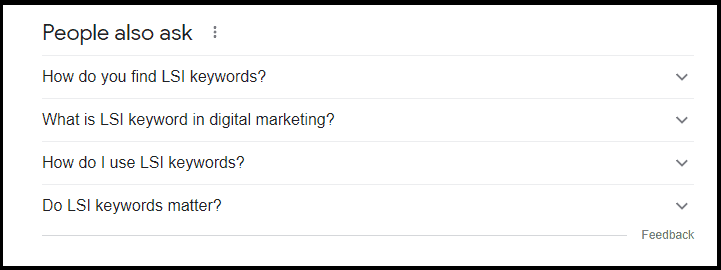
How You Can Use LSI Keywords in Your Content
The basic rule is to use these related terms as an alternative to your main term.
So, you should add them:
- Throughout your content
- In your title and headings
- In your meta tags
- In your image alt tags
Focus on User Experience
Even though LSI keywords are important for SEO, don’t stuff your pages full of them.
This will make your content difficult to read and it will turn off your readers.
Instead, focus on using these terms in a way that improves the user experience.

LSI Keywords FAQs
Q: Is Google using LSI?
A: Yes, Google is using Latent Semantic Indexing (LSI) to better understand the content and give more relevant results.
Q: How many times should I use LSI keywords?
A: You should use them as often as you would your main keyword. Don’t abuse. Or, it will make your content difficult to read.
Q: Does Google penalize for too many keywords?
A: If you add too many target terms to your webpage and repeat them to manipulate its relevance ranking, Google may penalize your website.
Q: What are some examples of LSI keywords?
A: Some examples are synonyms, variations, and related terms. For instance, if your main target is “SEO tips,” some LSI keywords might be “search engine optimization techniques,” “ranking higher on Google,” and “content marketing.”
Before You Go
LSI keywords are a great way to improve your website’s SEO.
But wait!
Are you looking to learn more about keywords?
Don’t miss to read these resources:
Now, it’s over to you.
What are your thoughts?
Let me know in the comments below!

Another article that has awesome learning. Surely sharing it with my circle. Keep up the good job… 🙂
Good to hear you are learning from it, Jayteerth.
I appreciate the awesome feedback. 🙂